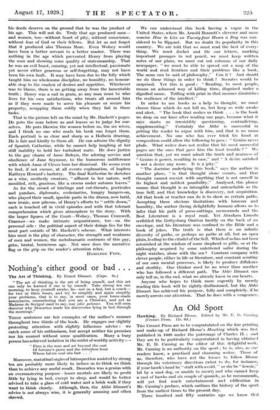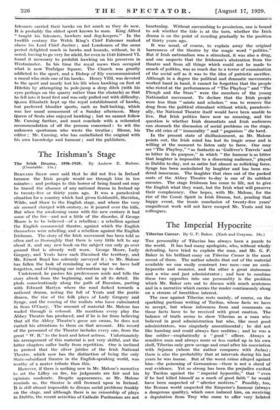An Old Sport
Hawking. By Richard Biome. Edited by Mr. E. D. Cuming. (Cresset Press. 12s. 6d.)
THE Cresset Press are to be congratulated on the fine printing and make-up of Richard Blome's Hawking which was first published in 1686 under the patronage of Charles II. ; and they are to be particularly congratulated in having obtained Mr. E. D. Cuming as the editor of this delightful work. Mr. Cuming is an authority on the sport ; he is, also, as our readers know, a practised and charming writer. Those of us, therefore, who have not the leisure to follow Biome through his veterinary directions (what to do, for instance, if your hawk's head be "stuft with a cold, " or she be " lowsie," bit by a mad dog, or unable to mewt) and who cannot keep a cast of hawks and six couple of spaniels, as he recommends, will yet find much entertainment and edification in Mr. Curaing's preface, which outlines the history of the sport from the earliest times to the present day.
Three hundred and fifty centuries ago we know that falconers carried their hawks on fist nriuch as they do now. It is probably the oldest sport known to man. King Alfred " taught his falconers, hawkers and dog-keepers." In the twelfth century the Welsh King's Chief Falconer ranked above his Lord Chief Justice ; and Londoners of the same period delighted much in hawks and hounds, without, be it noted, having to go very far afield, for even in 1549 Edward VI. found it necessary to prohibit hawking on his preserves in Westminster. In his time the royal mews then occupied what is now Trafalgar Square. The Church was greatly addicted to the sport, and a Bishop of Ely excommunicated a rascal who stole one of his hawks. Henry VIII. was devoted to the sport and nearly lost his • life when hawking on foot at Hitchin by attempting to pole-jump a deep ditch (with his eyes perhaps on the quarry rather than the obstacle) so that he fell into it head first and was only pulled out with difficulty. Queen Elizabeth kept up the royal establishment of hawks, but preferred bloodier sports, such as bull-baiting, which was her usual amusement of a Sunday afternoon. Mary Queen of Scots also enjoyed hawking ; but we cannot follow Mr. Cuming further, and must conclude with a reiterated recommendation of all the persons concerned : to wit the unknown sportsman who wrote the treatise ; Biome, his editor ; Mr. Cuming, who has embellished the original with his own knowledge and humour ; and the publishers.

































 Previous page
Previous page